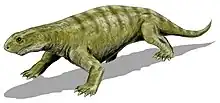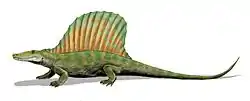Varanosaurus
Varanosaurus ('monitor lizard') is an extinct genus of early ophiacodontid synapsid that lived during the Artinskian[2] and Kungurian ages of the Permian.[3]
| Varanosaurus Temporal range: Early Permian, | |
|---|---|
 | |
| A reconstruction of Varanosaurus acutirostris | |
| Scientific classification | |
| Domain: | Eukaryota |
| Kingdom: | Animalia |
| Phylum: | Chordata |
| Clade: | Synapsida |
| Family: | †Ophiacodontidae |
| Genus: | †Varanosaurus Broili, 1904 |
| Type species | |
| †Varanosaurus acutirostris Broili, 1904 | |
| Species[1] | |
| |
Description

Varanosaurus acutirostris being devoured by Dimetrodon limbatus
As its name implies, Varanosaurus may have looked superficially similar to present-day monitor lizards, though not related at all.
Varanosaurus had a flattened, elongated skull and a pointed snout with a row of sharp teeth, including two pairs of conspicuous pseudocanines, implying that it was an active predator.[4]
Varanosaurus probably lived in swamps, competing with the larger Ophiacodon for food.
Classification
Below is a cladogram modified from the analysis of Benson (2012):[5]
| ||||||||||||||||||||||||||||||||||||||||||||||||||||||||||||||||||||||
See also
References
- "Varanosaurus". Fossilworks. Retrieved 17 December 2021.
- A. S. Romer. 1937. New genera and species of pelycosaurian reptiles. Proceedings of the New England Zoölogical Club 16:89-95
- R. R. Reisz. 1986. Pelycosauria. Handbuch der Paläoherpetologie / Encyclopedia of Paleoherpetology 17A:1-102
- Palmer, D., ed. (1999). The Marshall Illustrated Encyclopedia of Dinosaurs and Prehistoric Animals. London: Marshall Editions. p. 187. ISBN 978-1-84028-152-1.
- Benson, R.J. (2012). "Interrelationships of basal synapsids: cranial and postcranial morphological partitions suggest different topologies". Journal of Systematic Palaeontology. 10 (4): 601–624. doi:10.1080/14772019.2011.631042. S2CID 84706899.
Further reading
- Benes, Josef. Prehistoric Animals and Plants. Pg. 90. Artia: Prague, 1979.
This article is issued from Wikipedia. The text is licensed under Creative Commons - Attribution - Sharealike. Additional terms may apply for the media files.





.jpg.webp)